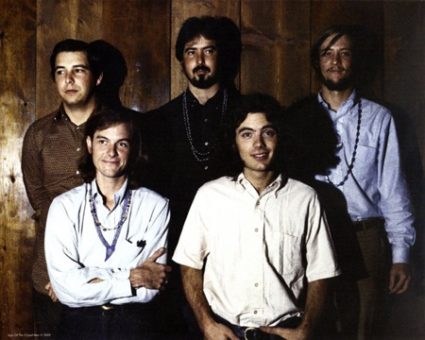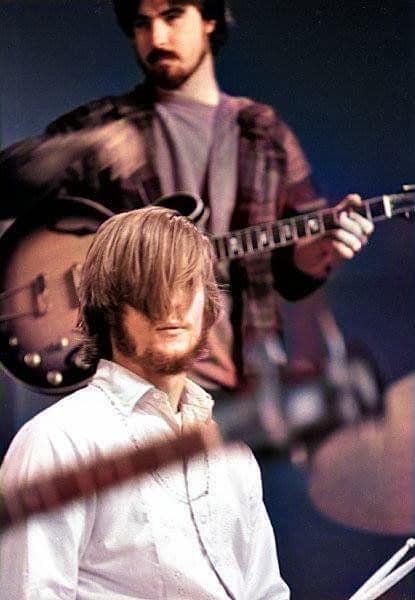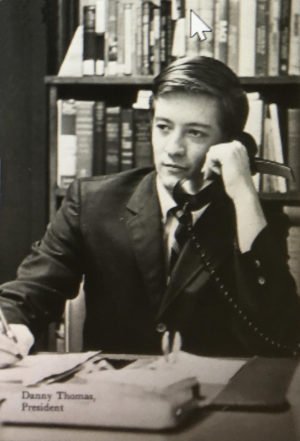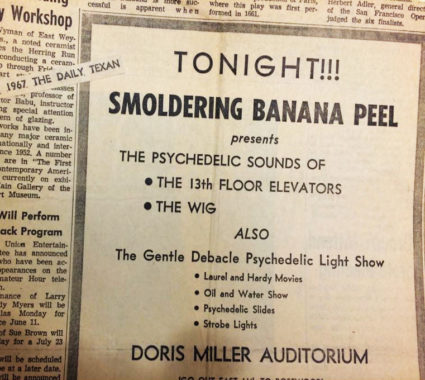The making of the 13th Floor Elevators’ album, ‘Easter Everywhere.’
HOUSTON — Danny Thomas, a former drummer-turned-author and a native son of North Carolina, celebrated his 71st birthday last January 15 in his hometown of Charlotte. Thomas, now semi-retired, is at that point in his life where he can stop and reflect back on the turbulent times of his youth and the happenstance chain of events that placed him on a fast-paced, roller coaster ride of both musical and chemical experimentation.
The direction of Thomas’ life would be one of transformation when he accepted the position as the replacement drummer of the Texas psych-rock band known as the 13th Floor Elevators.
Daniel DeWitt Thomas was born into a very old aristocratic East Coast family. His father’s “Pennsylvania Dutch” roots can not only be traced back to pre-Revolutionary War America, but his family was among the first settlers in the Carolinas. His mother’s family lineage equals that of her husband’s and can be linked to the original founding fathers of New Amsterdam, later to be renamed The City of New York by the British.
Thomas made his first pilgrimage to Texas in the summer of 1966.
Thomas made his first pilgrimage to Texas in the summer of 1966, right before he began his freshman semester as a music major at Trinity University in San Antonio. He was glad to finally be free from the influence and mores of his authoritarian and hypercritical father who was a Charlotte hospital administrator. Believing it would be best for his son to be exposed to a more regimented lifestyle during his teenage years, Thomas was enrolled in Culver Military Academy, near Fort Bend, Indiana, for high school.
However, there he excelled in the music and arts program, winning state competitions and recognition for the academy, which ultimately became his ticket out of Indiana, and to a life of freedom and self expression in Texas. After his acceptance into Trinity’s exemplary music program at the recommendation of the academy’s guidance counselor, Thomas found himself driving through the Southern heartland of America in his Ford Galaxie 500, en route to San Antonio. And as he reached the expansive landscape of Central Texas, he was reminded of the Saturday morning westerns he used to watch on television as a child.
Thomas soon settled into the routine of academic life.
Thomas soon settled into the routine of academic life during his first semester at Trinity. There, he not only attended classes during the day, but also found work drumming with local bands at night that were hired to perform at clubs along the River Walk and at the nearby military bases. It was in this musical milieu that he first met Daniel Raymond Galindo, a local Hispanic bassist who was raised on San Antonio’s North side, and who, at age 21, was a seasoned veteran of the local bar band scene. Galindo’s grandparents had immigrated to the United States from the town of Piedras Negras, Mexico, near the Texas border, in 1920.
“Danny Galindo was one funky South Texas, hard-driving Tejano rocker. He could play down-home funk, blues, and psychedelic rock and roll,” Thomas wrote in his fictional autobiography, Twice Born Vagabond (2016). “We used to play in combos together around San Antonio while I was a student at Trinity.”
Near the end of Thomas’ spring semester, fate intervened.
Near the end of Thomas’ spring semester, fate intervened and brought the freshman class president, and his college roommate, Charles Booker, to Austin one evening for a rock concert that was held on Austin’s Eastside at the Doris Miller Auditorium. Booker knew the Elevators’ lead guitarist, Stacy Sutherland, from his hometown of Kerrville, Texas, where they were both raised. Also in the audience was Thomas’ kindred spirit from San Antonio, bassist Danny Galindo. However, little did Thomas know, nor Galindo for that matter, that they would both become members of the very same band they had traveled to Austin to see perform that night.
An advertisement in UT’s Daily Texan student newspaper on April 13, 1967, announced: “The Smoldering Banana Peel Presents: The Psychedelic Sounds of the 13th Floor Elevators.” Everyone was there to hear the popular, cutting edge Central Texas band whose 45 RPM single, “You’re Gonna Miss Me,” from their debut album, reached the #55 position on the Billboard Hot 100 the previous year. They were also there to see the charismatic 20-year-old, Dallas-born and Austin-raised singer/songwriter named Roger Kynard “Roky” Erickson, who fronted the band.
After the concert, Thomas, Galindo, and Booker, were all invited to a party and an improvisational jam session taking place in a house off Riverside Drive, where Sutherland was also in attendance. Galindo had the foresight to give Sutherland his and Thomas’ phone numbers in San Antonio, where they could be reached at a later date if need be. Less than two months from his first encounter with Sutherland, Thomas received a message in his dorm room to call Lelan Rogers, the national promotional rep for the Elevators’ record company, International Artists, in Houston.
‘I arrived for the interview dressed in a coat and a tie with my shoes shined.’
“I was in the car headed for Houston within an hour of the phone call,” Thomas related from his hometown of Charlotte. “I met the band and Lelan [Rogers] the same day in Nobel Ginther’s law office in downtown Houston. I had only smoked pot a few times and had never taken any real drugs before,” Thomas added. “I arrived for the interview dressed in a coat and a tie with my shoes shined. I never even auditioned. Rocky and Tommy took Stacy’s recommendation without question.”

13th Floor Elevators, 1967. Top (L-R) Galindo, Sutherland, Thomas. Bottom (L-R) Hall, Erickson. Courtesy International Artists.
As a result of the serendipitous encounter with Sutherland at the after-hours jam session in Austin, the 19-year-old “Charlottean” with his “in-the-pocket” drumming style left the meeting with label owners, Billy Dillard and Nobel Ginther, as the newest member of the 13th Floor Elevators, replacing the band’s original drummer, John Ike Walton. Soon after, Danny Galindo would also be asked to join the band as a replacement for then-bassist, Ronnie Leatherman.
‘Thinking back, everything happened real fast,’ recalled Thomas.
“Thinking back, everything happened real fast,” recalled Thomas in his “Down East,” North Carolina accent. “I got the call in May, finished the semester at Trinity, that put me in Kerrville in June, we rehearsed for three months that summer at Stacy’s parent’s ranch, then we returned to Houston to record at Walt Andrus’ studio in September — and the album was released in November of 1967.”
After he completed his spring semester at Trinity, Thomas traveled to Kerrville where he began rehearsing with the other band members — Erickson, Sutherland, Hall, and now Galindo — who were working on a new body of work that would become the seminal and iconic psych classic album, Easter Everywhere. Two tracks had already been completed and mixed using the Elevator’s original drummer, John Ike Walton, and bassist, Ronnie Leatherwood. However, the Elevator’s rhythm section became disgruntled in mid-session by the questionable business practices of their label, the excessive psychotropic drug experimentation by the other band members in their quest for spiritual enlightenment, and the unwanted attention that the band continually drew from law enforcement because of their chosen spiritual quest.
‘There was a philosophical confrontation between John Ike and Tommy [Hall].’
“There was a philosophical confrontation between John Ike and Tommy [Hall],” Thomas confided. “John Ike was an adversary to Tommy’s philosophical point of view and he was counting on Roky and Stacy following him when the confrontation occurred. The only one who followed John Ike was Ronnie [Leatherman]. That’s what caused the band to fracture, and when that happened, that’s when they called me.”
 All the band members moved to Houston while they recorded their sophomore album at Andrus Studios, located at 3204 Broadway, off the Gulf Freeway. However, studio owner Walt Andrus became increasingly annoyed by the extreme amount of time the band was taking to record each new composition that he relieved himself of his producing duties in mid-session and left his engineer, Frank Davis, in charge. Davis was given instructions by Andrus to record the best take of these new compositions and to get them down on tape on his new, state-of-the-art 8-track, multi-track recorder. Thomas recalled that the Elevators were attempting to create an album that was truly unique for a band from Texas that spoke to their generation; he also believes it never would have reached fruition without the insight and patience of Davis.
All the band members moved to Houston while they recorded their sophomore album at Andrus Studios, located at 3204 Broadway, off the Gulf Freeway. However, studio owner Walt Andrus became increasingly annoyed by the extreme amount of time the band was taking to record each new composition that he relieved himself of his producing duties in mid-session and left his engineer, Frank Davis, in charge. Davis was given instructions by Andrus to record the best take of these new compositions and to get them down on tape on his new, state-of-the-art 8-track, multi-track recorder. Thomas recalled that the Elevators were attempting to create an album that was truly unique for a band from Texas that spoke to their generation; he also believes it never would have reached fruition without the insight and patience of Davis.
‘There aren’t enough good things that I can think of to say about Frank Davis.’
“There aren’t enough good things that I can think of to say about Frank Davis,” Thomas explained. “He’s the one that made Easter Everywhere a very special album. A matter of fact Walt [Andrus] would become so frustrated with us because we were taking so much time recording it that he would just leave and go home. It was Frank who knew what we were trying to do. He knew it was more than just hard rock or dance music we were recording, and that we were trying to send a message. He was hip to that and Walt was not, and because of Frank, that album finally got finished.”
Frank Davis, age 78, now comfortably resides in an Austin assisted-living facility where he receives the care needed for his vascular dementia that resulted from a series of mini-strokes that transpired during the past 10 years.
Working as a hospital administrative assistant, among other jobs, since relocating back to Charlotte in 1977, Thomas is very philosophical about the direction his life has taken since his post-Elevators days. “The time I spent playing the drums and my contribution in helping to arrange songs for recording with the 13th Floor Elevators has found a place in the world that has become ‘forever lasting plastic words,’” he said borrowing the title of a composition by fellow International Artists label mates, Lost and Found. “It took a lot of patience and commitment but it was worth it. I do miss it,” Thomas continued, “but having said that, I am now at peace in the present and relieved that all that responsibility has been lifted from my shoulders. I have completely adjusted to not having that sort of excitement in my life anymore.”
Thomas is also very circumspect to pass judgment and to comment on the body of work that makes up the album, Easter Everywhere. When the subject was brought up regarding what he considers to be his favorite track, he hesitantly replied, “Each one is unique, so I’m going to have to use that as my answer. However, if I had to really choose one, I would say it was the one where I only played hi-hat and tambourine on, and that would be the composition called, ‘I Had to Tell You,’ I think that’s a beautiful song,” Thomas said referencing the contemplative ballad that was co-authored by the late Roky Erickson and Tommy Hall’s wife, Clementine. He then paused and added, “It’s the song that keeps me sane.”
Read “A candid portrait of Daniel DeWitt Thomas, Part 2: The making of the album, Free Form Patterns” by Ivan Koop Kuper on The Rag Blog.
[Ivan Koop Kuper is a freelance writer, real estate broker, professional drummer, and podcaster, and an frequent contributor to The Rag Blog. Visit him online on Twitter and Instagram: @koopkuper.]
- Read articles by Ivan Kuper about Huey P. Meaux, Michael Condray, Eagle Pennell, Stacy Sutherland and Bunni Bunnell, Don Sanders — and more — on The Rag Blog.





















Big, big thanks for this little story! Is there a part 2 somewhere? Please let me know. This is gold to me.
You can read Part 2 here: https://www.theragblog.com/ivan-koop-kuper-a-candid-portrait-of-daniel-dewitt-thomas-part-2/
As a thirteen year old eighth grader at Culver Military, Danny, a junior, was assigned to school me and some other “plebes” (first year cadets) in appearance,
shining shoes and brass, and basic barracks protocol. Many of the older guys were quite
mean when interacting with plebes, which was traditional, but Danny was never mean to anyone. We were both drummers in the band and often played together in the smaller pep band at football and basketball games. That was the most fun I had there; during halftime at one of the basketball games, Danny drummed with a rock band along with some of the band’s other edgier members. He was considered the most versatile drummer we had.